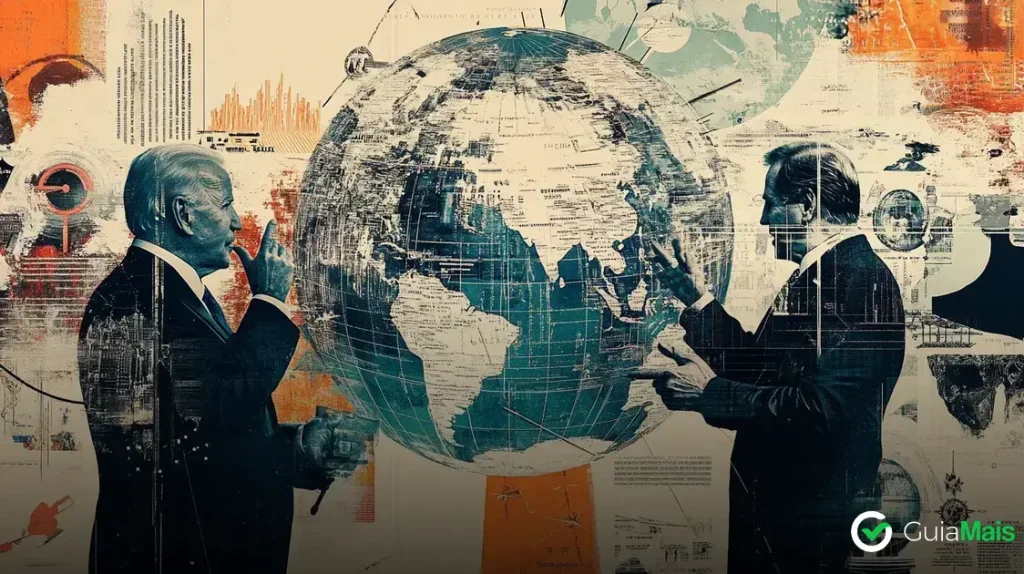Political news insights include the current political landscape, influential figures, media impact, campaign strategies, and public opinion.
Understanding these aspects is crucial for grasping developments in politics today and navigating the ever-evolving news environment.
Political news insights are essential for navigating today’s complex world. In our fast-paced environment, understanding the intricacies of political landscapes can be daunting.
Join us as we explore pivotal events and what they mean for the future.
Current Political Landscape
Countries such as the United States and South Africa are experiencing increasing political polarization, with people fiercely aligned with their respective parties.
Political News Insights highlights how this division can lead to intense debates and sometimes violence, as key issues divide voters.
Global Trends Influencing Politics
Across the world, there are several significant trends shaping political developments. For instance, the rise of populism and nationalism has altered traditional party dynamics.
Voters are increasingly attracted to leaders who promise to prioritise national interests over global obligations.
Political Polarisation
Countries such as the United States and South Africa demonstrate increasing political polarisation, where people align fiercely with their respective parties.
This division can lead to intense debates and sometimes violence, as fundamental issues split the electorate.
Influence of Social Media
Social media plays a critical role in shaping public opinion and political discourse.
Platforms like Twitter and Facebook enable rapid dissemination of information, but they also open the door to misinformation and echo chambers that reinforce existing biases.
Economic Factors at Play
The economy is a powerhouse in the political landscape. Economic crises or booms can drastically affect governmental stability and public trust.
Today, issues like unemployment, inflation, and economic policy are at the forefront of political discussions.
Environmental Concerns
As the climate crisis intensifies, environmental policies are becoming a significant part of political agendas.
Voters are aligning with parties that advocate for sustainable practices, pushing climate action to the top of political conversations.
International Relations
The relationships between nations are also vital in the current political landscape.
Events like trade negotiations, treaties, and diplomatic relations are all intertwined with domestic politics, influencing how leaders govern and campaign.
Understanding Voter Behaviour
Understanding who votes and why is essential to navigating the current political environment.
Demographics, socioeconomic status, and personal values all shape voter decisions, making it important to analyse these factors regularly.
Key Political Figures and Their Influence
Key political figures around the world hold significant influence over national and international policies.
These leaders shape public opinion and drive change through their actions and rhetoric.
Presidents and Prime Ministers
Leaders like the President of the United States and the Prime Minister of the United Kingdom play crucial roles on the global stage.
Their decisions can affect not only their own countries but also international relations, trade agreements, and climate policies.
Influential Legislators
In addition to heads of state, influential legislators shape legislation and government policy.
In many countries, the Speaker of the House, Senate leaders, and key committee chairs hold significant sway over what laws get proposed and passed.
Powerful Political Parties
Political parties themselves can act as significant players in shaping governance.
Party leaders can mobilise resources, coordinate campaigns, and influence public perception, guiding political developments in their favour.
Activists and Grassroots Leaders
Grassroots activists and community leaders often spur political movements that influence policy.
Their ability to mobilise citizens can lead to significant changes, especially in crucial issues like human rights, education, and environmental reform.
Media Figures
Media personalities often shape political narratives. Journalists, commentators, and social media influencers sway public opinion, making their voice loud within political discourse.
Influence of Scholars and Think Tanks
Academics and think tanks contribute to political discussions through research and analysis. Their findings inform policy debates, making their influence felt in legislative chambers.
Business Leaders
Business magnates wield power over political decisions by lobbying and funding campaigns. Their financial contributions can significantly impact election outcomes and policy directions.
Impact of Media on Political News

The impact of media on political news is profound and multifaceted. Political News Insights highlights how media serves as a bridge between government actions and public understanding.
It has the power to shape narratives, influence opinions, and even determine election outcomes.
Role of Traditional Media
Traditional media, such as newspapers and television, historically played a crucial role in informing the public.
These outlets help set the agenda by deciding which stories are newsworthy. Their coverage can amplify certain political messages and influence public opinion.
Emergence of Digital Media
With the rise of the internet, digital media has transformed how political news is consumed.
Online platforms allow for faster dissemination of information, but they can also spread misinformation.
This presents challenges in ensuring that the news is accurate and reliable.
Social Media Influence
Social media platforms, such as Twitter and Facebook, enable politicians to communicate directly with the public.
Political News Insights highlights how this immediacy fosters direct engagement but may also lead to responses that bypass traditional journalism.
As a result, social media becomes a crucial arena for political debate.
The Echo Chamber Effect
Many users curate their news feeds, often selecting sources that align with their beliefs.
This echo chamber effect can reinforce existing views, making it harder for individuals to engage with differing perspectives.
It is essential for consumers to recognise this tendency to foster a more balanced understanding of political issues.
Fact-Checking and Accountability
With the prevalence of false information, the role of fact-checking organisations has become critical.
These groups help verify claims made by politicians and the media, holding both accountable.
Public awareness of fact-checking resources can promote informed decision-making among voters.
Impact on Political Campaigns
Political campaigns heavily rely on media coverage to shape public perception.
Political News Insights highlights how candidates use media strategically to showcase their policies and counter opponents’ narratives.
This dependence on media can dictate how effectively messages are conveyed and received by voters.
Future Trends in Media and Politics
As technology continues to evolve, the landscape of political news will also change. Innovations such as virtual reality and artificial intelligence may produce new ways of storytelling and engagement.
Staying informed about these trends will be essential for navigating future political news.
Understanding Political Campaign Strategies
Understanding political campaign strategies is essential for navigating the complex world of elections.
Candidates employ various techniques to connect with voters, gain support, and ultimately win seats in government.
Target Audience Identification
Successful campaigns begin by identifying the target audience. Candidates must understand who their voters are, what concerns them, and how to communicate effectively.
This knowledge helps tailor messages that resonate with specific demographic groups.
Crafting a Compelling Message
A strong, clear message is vital for any political campaign. Candidates need to articulate their vision, policies, and values in a manner that captivates voters.
The message should be consistent across all platforms, reinforcing the candidate’s brand and intentions.
Utilising Data Analytics
Modern campaigns increasingly rely on data analytics to guide strategy.
By analysing voter behaviour, preferences, and engagement patterns, candidates can make informed decisions about outreach efforts and messaging.
Engaging with Voters
Building a connection with voters is crucial. Candidates often engage through town hall meetings, social media, and community events to create a personal bond.
This direct interaction helps voters feel valued and fosters loyalty.
Leveraging Media and Advertising
Media plays a significant role in campaigning. Candidates often utilise traditional media, such as television and radio, alongside digital advertising.
A well-structured advertising campaign can effectively spread the candidate’s message and reach wider audiences.
Fundraising Strategies
Effective fundraising is central to any political campaign. Candidates need funds to support their activities, from advertising to events.
Strategies might include fundraising dinners, online crowdfunding, and small donor programmes to encourage grassroots support.
Adapting to Challenges
Campaigns often face unforeseen challenges, such as negative press or shifts in public opinion. Candidates must stay agile and adapt strategies quickly to maintain momentum.
Transparency and responsiveness are critical to address concerns and keep voter trust.
Major Political Events of the Year
Political News Insights highlights how major political events of the year have a profound impact on the global landscape.
These events shape policies, alter power dynamics, and influence public opinion.
Presidential Elections
This year saw significant presidential elections in several countries. The outcomes not only affect national governance but also influence international relations.
The campaigns leading up to these elections have been intense, highlighting key issues and voter concerns.
Legislative Changes
Various nations enacted important legislation that addresses critical social issues.
For example, bills pertaining to healthcare, education, and climate change have sparked debates and mobilised public support.
Environmental Summits
Global gatherings focusing on climate change have taken centre stage in the political arena.
These summits bring world leaders together to discuss agreements and strategies to combat environmental challenges, highlighting the urgent need for action.
Social Movements
This year has also witnessed powerful social movements advocating for gender equality, racial justice, and human rights.
These movements have mobilised citizens and pressured governments to address longstanding issues.
International Conflicts
Several regions faced escalating conflicts that demanded international attention. Diplomatic efforts to resolve these tensions are vital, as the ramifications affect global stability and security.
Public Health Responses
The ongoing response to public health crises, particularly in relation to COVID-19, has continued to dominate political discussions.
Governments are tasked with balancing public safety measures while reviving their economies.
Technological Regulation
As technology continues to evolve, so does the need for regulations.
Discussions around data privacy, cybersecurity, and the role of big tech in politics have gained traction this year, reflecting concerns about impacts on democracy.
Political News and Public Opinion

Political news and public opinion are interlinked in significant ways. The media plays a crucial role in shaping how the public perceives political events, policies, and candidates.
The Role of Polling
Polling data provides insights into public opinion. Political analysts use polls to gauge how citizens feel about specific issues, party allegiance, and candidate favourability.
This information can influence campaign strategies and policies.
Media Influence
The media can significantly affect public perception. Coverage of political events, debates, and scandals can sway public opinion either positively or negatively.
Balanced reporting is essential to keep the public informed accurately.
Social Media’s Impact
Social media platforms allow citizens to share their opinions widely. This has changed the way political news spreads, with posts, tweets, and shares helping shape narratives quickly.
However, misinformation can easily spread, complicating public understanding.
Public Engagement
Public engagement in political discussions has grown with the rise of digital communication.
Citizens now have more opportunities to express their views through online forums, comment sections, and social media activism. This increased engagement fosters a more active citizenry.
Feedback Mechanisms
Politicians often use public feedback to guide their actions.
Constituents’ reactions to proposed legislation or government decisions can signal whether a politician’s approach aligns with the electorate’s desires.
Impact of Major Events
Major political events, such as elections or crises, can lead to shifts in public opinion. Citizens tend to react strongly to significant issues, and their responses can reshape political landscapes.
Long-Term Trends
Understanding long-term trends in public opinion is essential for political strategists.
Factors such as economic changes, social movements, and demographic shifts play a critical role in shaping the public’s view over time.
Future Trends in Political Reporting
Future trends in political reporting are shaped by technological advancements and changing public expectations.
These trends highlight the need for adaptability in journalism as the political landscape evolves.
Emphasis on Digital Journalism
Digital journalism continues to grow, with more news being consumed on mobile devices and online platforms.
Reporters will need to focus on creating engaging and accessible content tailored for digital audiences, including videos and interactive features.
Data Journalism
The use of data in political reporting is becoming crucial. Journalists are increasingly employing data analytics to provide in-depth coverage of political events, electoral trends, and government actions.
This approach helps to present complex information in a more understandable format.
Increased Verification Processes
As misinformation spreads rapidly, the demand for fact-checking and verification in political reporting has intensified.
Journalists will need to adopt stringent verification processes to ensure the accuracy of their reports, fostering trust with audiences.
Audience Engagement
Engaging with audiences will be critical for news outlets.
Comment sections, social media interactions, and live Q&A sessions can help news organisations create a community around their reporting, encouraging public dialogue and feedback.
Focus on Local Reporting
There is a growing recognition of the importance of local news. Political reporting will increasingly include local issues and events, as they often serve as a barometer for national trends.
This focus can help reconnect communities with their local journalists.
Innovative Storytelling Techniques
Future political reporting will utilise innovative storytelling techniques, including multimedia content and immersive experiences.
This can include podcasts, virtual reality, and live reporting, capturing audiences’ attention in new ways.
Transparency and Accountability
As the public demands greater transparency in government, political reporters will need to uphold accountability by scrutinising government actions and ensuring that citizens are informed about political processes and decisions.
In Summary: The Evolution of Political News
The landscape of political news is continuously evolving, shaped by factors such as media influence, public opinion, and innovative reporting techniques.
Understanding the current political landscape, key figures, and the impact of major events provides a foundation for analysing future trends.
As digital journalism gains traction and data-driven reporting becomes commonplace, it is essential for journalists to engage with their audiences meaningfully.
The emphasis on local reporting and accountability will play a crucial role in fostering an informed electorate.
Ultimately, by embracing these changes, the future of political reporting will not only inform the public but also empower citizens to participate actively in the democratic process.




